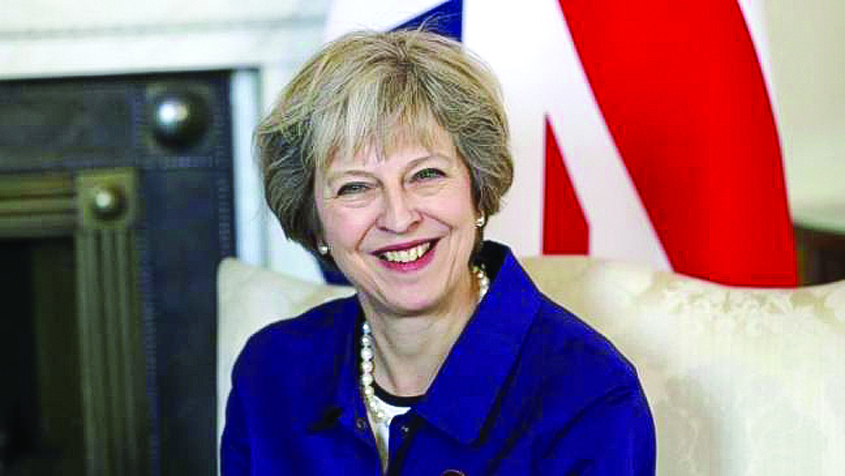Sunday mornings have become political prime time and not just for newspapers, but on television as well. Since 2007, BBC’s Andrew Marr Show has been the go to viewing. Traditionally, Marr has hosted the Prime Minister at the start of a New Year. In 2016, ITV launched Robert Peston’s Sunday show; last week Sky introduced their news presenter’s new format across a large glass digital table top, Sophy Ridge on Sunday. The Prime Minister chose Sophy on Sky to give her first television interview, eclipsing Andrew Marr and his guest Nicola Sturgeon (First Minister of Scotland). May’s theme of the week is her idea of the “Shared Society”, where the government addresses the everyday social injustices affecting ordinary working class families that have previously been neglected; May believes this neglect has created the resentments and divisions of today. On Monday, at the Charity Commission’s annual meeting, she said, “Politicians who embraced the twin pillars of liberalism and globalisation as the great forces for good that they are, but failed to understand that for too many people — particularly those on modest to low incomes living in rich countries like our own — those forces are something to be concerned, not thrilled, about.” May emphasised her commitment to resolve the “burning injustices” affecting those with mental illness (she quoted that the economic and social cost of mental illness to UK is £105 billion, circa the same as the total cost of the NHS); she promised a new agenda of social reform for mental health, housing and industrial strategy.
The first Prime Minister’s Question Time this year was dominated by Leader of the Opposition Jeremy Corbyn’s relentless hammering at PM May about the inadequacies of the National Health Service (NHS). He quoted the words of the Red Cross, which said the NHS was having a “humanitarian crisis”. May responded that the criticisms were “irresponsible and overblown”, as the NHS accident and emergency departments had treated 2.5 million more people than six years previously (during the last Labour government). The NHS is one of the chosen battlegrounds for Labour to attack the Conservative Party; it is such a monumentally complex and expensive structure, whose benefit too many take for granted, that it is easy to joust about.
The Government Consultation on Press Regulation has closed. Section 40 of the Crime and Courts Act 2013 would, if enacted, make media outlets responsible for paying the entire costs of libel and defamation cases, even if they won. This could be potentially disastrous, encouraging liberals to take to the courts and ruinous to media houses. Ostensibly, the Section 40 implementation would inhibit a free press. Many claim this is tantamount to “state sponsored” press regulation. The alternative offered is signing up to a state-approved regulator. Section 40 is being actively opposed by major news organisations including the Press Association. The majority of citizens and voices on social media have also rejected Section 40.
The Supreme Court ruling about triggering Article 50 for Brexit without MP’s approval is due next week. The Sunday Guardian’s sources say a ruling by the eleven judges
Everything in London was inconvenienced and delayed this week by the gridlock of the Tube strike, organised by the transport union RMT and reinforced by the TSSA union, both supporters of Jeremy Corbyn. Labour’s Sadiq Khan, the Mayor of London, who received considerable campaign support from these same unions during his 2016 mayoral campaign and who in early 2016 pledged “zero days of public transport strikes if I am elected mayor”, apparently did not use his influence to deter the strike. RMT has confirmed a new phase of action beginning on 6 February, suggesting that Corbyn, the unions and the mayor are working in tacit harmony to make life uncomfortable for both Londoners and the Conservative Prime Minister. The Evening Standard reported that Transport for London, the subordinate to the Mayor of London responsible for London’s transport system, spent £4.4 million last year paying union representatives to perform union duties, rather than their regular jobs.
Corbyn this week proposed a cap on wages, possibly at less than 20:1 of the lowest paid worker in an organisation and introducing a top income tax rate of 100% in an attempt to share power and wealth equally within society, promoting another vision of a sharing society.
Finally, Clare Hollingworth, the indomitable British war correspondent, who broke the story of World War II, died this week in Hong Kong aged 105. Considering the hullabaloo around recent less worthy recipients, it is a matter of amazement that this remarkably adventurous journalist was not awarded a knighthood for services to the country, especially in her military reportage capacity. “Dame” Clare Hollingworth would have more than merited the honour.

